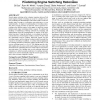499 search results - page 7 / 100 » Search Engines that Learn from Implicit Feedback |
SIGIR
2005
ACM
15 years 4 months ago
2005
ACM
Implicit relevance feedback (IRF) is the process by which a search system unobtrusively gathers evidence on searcher interests from their interaction with the system. IRF is a new...
ATAL
2005
Springer
15 years 4 months ago
2005
Springer
The number of web pages available on Internet increases day after day, and consequently finding relevant information becomes more and more a hard task. However, when we consider ...
97
Voted
SIGIR
2011
ACM
14 years 1 months ago
2011
ACM
Search engine switching is the voluntary transition between Web search engines. Engine switching can occur for a number of reasons, including user dissatisfaction with search resu...
SIGIR
2005
ACM
15 years 4 months ago
2005
ACM
This paper examines the reliability of implicit feedback generated from clickthrough data in WWW search. Analyzing the users’ decision process using eyetracking and comparing im...
92
Voted
NAACL
2010
14 years 9 months ago
2010
The goal of this work is to integrate query similarity metrics as features into a dense model that can be trained on large amounts of query log data, in order to rank query rewrit...

